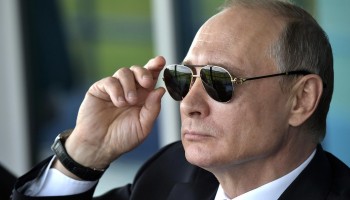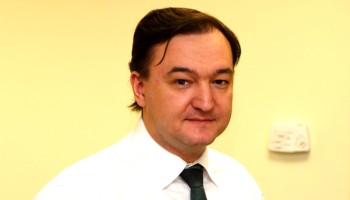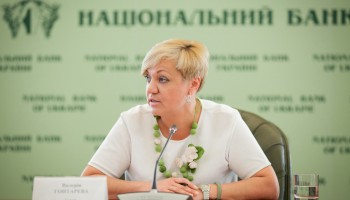A former butcher worth US$ 550 million. A shipping company employee who amassed $573 million. A cellist whose offshore firms handled $2 billion.
It sounds like a dreamland.
But this is Russia. And the unlikely rich have two things in common: They can’t explain their wealth and they are either friends or relatives of President Vladimir Putin.
Some say it’s actually Putin’s money.
“Putin is a kleptocrat,” William Browder, a US-born anti-Putin campaigner, told OCCRP in an interview.
“The main purpose of his reign over Russia over the last 17 years has been to steal as much money as possible.”
Browder leads the international effort to sanction Russians involved in human rights abuses. His campaign is tied to the name of his lawyer Sergei Magnitsky, who was jailed after accusing Russian officials of theft. He died a year later after being denied medical attention. Human rights groups say he was beaten to death.
But apart from being a kleptocrat, Browder explained that Putin is also a former KGB agent who understands that, if he had a lot of money in his bank accounts, he would be vulnerable to blackmail.
“There is not a single penny registered in his name,” Browder said. “It’s registered in other people’s names.”
Whom can Putin really trust that much?
The money holders appear to be people he was close to before becoming president.
One is Mikhail Shelomov, the 48-year-old son of Putin’s cousin, who works at a shipping company for a job that typically pays $8,500 per year and lives an ordinary life.
But according to Russian business records, Shelomov invested in a top-tier new racetrack and has stakes in several multi-million companies connected to Putin’s wealthy friends, and has, over the past few years, accumulated hundreds of millions of dollars. (See: Relative Wealth in Russia)
When reporters asked him about his wealth, Shelomov gave a “who me?” reaction.
The racetrack he “heard about,” but does not know more. The shares in the multi-million companies he also “heard about, but not more.”
Or take Sergei Roldugin, a cellist and one of Putin’s oldest friends -- his daughter’s godfather. The two spent their young adulthoods backing each other up in street fights and confiding in each other over their romantic pursuits, according to Putin’s autobiography.
Roldugin claims not to be a businessman. But last year’s Panama Papers revelations established that the musician either directly or indirectly owns several firms in tax havens, and that those firms received funds from Russian state-owned banks and companies owned by Putin’s new oligarch friends.
The Panama Papers showed that the modest artist with the secondhand cello had companies through which two billion dollars flowed.
According to Putin, the humble musician soundly earned his money and "intended to use it to buy instruments to donate to charity," wrote Foreign Affairs.
And what about Peter Kolbin? According to his school teachers and neighbors, he’s Putin’s childhood friend.
The former butcher lives a quiet life and also denies being a businessman. Yet, somehow, he is a shareholder of a company that has, in the past, traded about one-third of Russian oil and is owned by Russia’s third richest man, a billionaire who is – guess what? - another old oligarch and new Putin friend.
Browder calls people like Shelomov, Roldugin, and Kolbin “nominees” who only formally own all these assets, but in fact, “it’s his personal money.”
So why are Putin’s new friends being so generous to his old ones?
Browder says that the billionaires “have a hell of a lot to lose if they cross him.”
In order to keep their wealth, he claims, the oligarchs were forced to hand over some of it to Putin.
Mikhail Khodorkovsky, a man who was once believed to be the wealthiest in Russia with a fortune estimated to be worth $15 billion, refused to go along with the system.
In fact, Khodorkovsky says, he challenged grand corruption in a 2003 Kremlin meeting. Not long afterwards, he was arrested and charged with fraud and tax evasion. His assets were frozen and the government drove his company into bankruptcy.
On the top of that, he was sentenced to nine years in prison. Upon his release in 2013, Khodorkovsky left Russia and was granted residency in Switzerland.
By then he is believed to have been down to $100–250 million.
“That was the purpose of that exercise,” said Browder, who claims that every oligarch in Russia was forced to give Putin 50 percent of his wealth.
“To take everything away from one guy. To say that half of 15 billion is better than 100 percent of nothing,” he explained.
Khodorkovsky himself says that, while he was a leading Russian businessman, there were seldom explicit demands for money. Instead, he said in an interview with OCCRP, “you yourself should understand how much you’re supposed to give.”
“This is simply a gang,” Khodorkovsky continued, “It’s built like a gang and the relationships are absolutely like in a gang. ... And in these gang relationships, the issue of bringing a portion to the leader has a sacral function. Do you respect him or don’t you?”
After Khodorovsky’s experience, not many other oligarchs dared to disobey the president. Instead, they befriended him -- and these are the people Browder calls the “trustees.” They handed over some of their wealth to him in order to keep the rest.
Browder is just one voice in the chorus of analysts and former oligarchs who fled their country after rows with the president.
“Everything that belongs to the territory of the Russian Federation, Putin considers to be his," Sergei Pugachev, who used to be “the Kremlin’s banker,” told The Guardian in a 2015 interview.
"Everything,” he said. “Gazprom, Rosneft, private companies.” Any attempt to calculate Putin’s wealth would never succeed, said Pugachev, who fled to London in 2011 after his relations with Putin soured and his $15 billion business empire was raided by the government.
Now he is down to $70 million, he said.
But there is a catch to Putin’s wealth. He may be the richest person in the world now - but only “until he leaves power,” Pugachev said.
Browder agrees. “The only way he can really truly control his money is if he stays president,” he said, explaining that if Putin lost power and then called his nominees asking for his billion, their response would be: “Vladimir who?”
The “trustees” could go after him, put him in jail, or even kill him.
“There is no exit strategy. It’s a totally untenable situation,” Browder said. “He can’t set up the Vladimir Putin presidential library and give lectures.”





